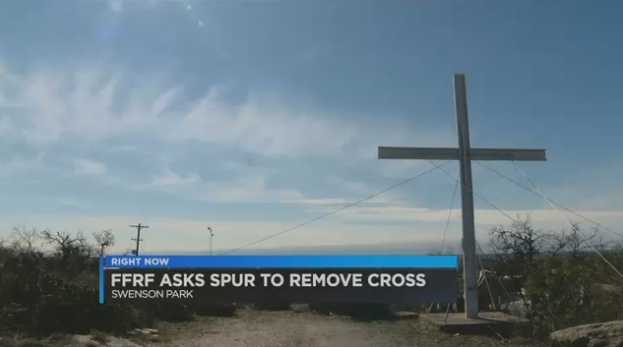
SPUR, Texas — A prominent professing atheist group is seeking the removal of a cross displayed at a public park in Texas as it asserts that the symbol violates the U.S. Constitution.
The Wisconsin-based Freedom From Religion Foundation (FFRF) sent a letter earlier this year to the mayor of Spur, and then again in October, but did not receive a response to their demand. At issue is a 12-foot cross erected in Swenson Park, which reportedly can be viewed when driving into town.
“The government’s permanent display of a Latin cross on public land is unconstitutional,” the first letter read. “The display of this patently religious symbol on public property confers government endorsement of Christianity, a blatant violation of the Establishment Clause.”
The cited clause reads, “Congress shall make no law respecting an establishment of religion or prohibiting the free exercise thereof…”
FFRF asserts that the cross makes unbelievers feel like outsiders in their community.
“The cross unabashedly created the perception of government endorsement of Christianity,” its letter stated. “The cross has an exclusionary effect, making non-Christian and unbelieving residents of Spur political outsiders.”
It therefore requested that the cross be removed or relocated to private property.
Officials in the small farming and ranching community are not commenting on the matter, nor have they replied to FFRF, but residents state that most have no issue with the display and find that it brings them comfort and hope.
“We want the cross left there,” Jackie Rumbaugh told the Daily Republic. “We think it is good.”
“I can look right up and see the cross and I know God’s watching me. So I know I’m ok,” Polly Daza told KCBD-TV, adding, “We feel secure with the cross here. It’s part of Spur; it’s part of us.”
“I bet you if I could call everybody in Spur to come and line up behind me, they’d do it,” Frances Blackburn said. “We’re not taking it down.”
FFRF advised earlier this month that it plans to send yet another letter contending that the cross is illegal.
“As long as the cross remains on public property the city is exposing itself to legal liability,” attorney Sam Grover contended. “They’re breaking the law and anyone within the community could sue and win in court.”
In issuing a proclamation calling for a national day of repentance and prayer, President John Adams declared on March 23, 1798, just 11 years after the signing of the U.S. Constitution, “[T]he safety and prosperity of nations ultimately and essentially depend on the protection and the blessing of Almighty God, and the national acknowledgment of this truth is not only an indispensable duty which the people owe to Him, but a duty whose natural influence is favorable to the promotion of that morality and piety without which social happiness can not exist nor the blessings of a free government be enjoyed.”
The following year, in again issuing the proclamation, Adams cited Proverbs 14:34 and Romans 13:3, requesting that Americans pray that God “would make us deeply sensible that ‘righteousness exalteth a nation, but sin is a reproach to any people'” and that “He would bless all magistrates, from the highest to the lowest, give them the true spirit of their station, make them a terror to evildoers and a praise to them that do well.”
Become a Christian News Network Supporter...


